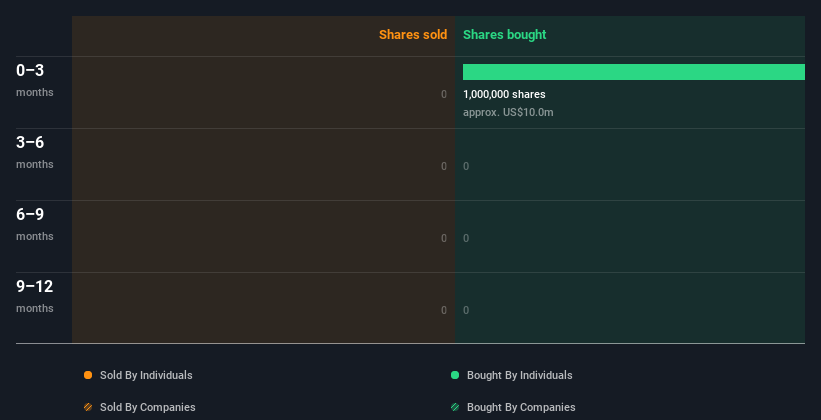- United States
- /
- Real Estate
- /
- OTCPK:WEWK.Q
As WeWork Inc. (NYSE:WE) drops to US$6.8b market cap, insiders might rethink their US$10m stock purchase earlier this year
Insiders who bought US$10m worth of WeWork Inc.'s (NYSE:WE) stock at an average buy price of US$10.00 over the last year may be disappointed by the recent 9.8% decrease in the stock. Insiders purchase with the hope of seeing their investments increase in value over time. However, due to recent losses, their initial investment is now only worth US$9.5m, which is not great.
While insider transactions are not the most important thing when it comes to long-term investing, we do think it is perfectly logical to keep tabs on what insiders are doing.
Check out our latest analysis for WeWork
The Last 12 Months Of Insider Transactions At WeWork
In the last twelve months, the biggest single purchase by an insider was when Lead Independent Director Bruce Dunlevie bought US$10m worth of shares at a price of US$10.00 per share. So it's clear an insider wanted to buy, even at a higher price than the current share price (being US$9.53). While their view may have changed since the purchase was made, this does at least suggest they have had confidence in the company's future. We always take careful note of the price insiders pay when purchasing shares. Generally speaking, it catches our eye when an insider has purchased shares at above current prices, as it suggests they believed the shares were worth buying, even at a higher price. Bruce Dunlevie was the only individual insider to buy during the last year.
The chart below shows insider transactions (by companies and individuals) over the last year. If you click on the chart, you can see all the individual transactions, including the share price, individual, and the date!

There are always plenty of stocks that insiders are buying. So if that suits your style you could check each stock one by one or you could take a look at this free list of companies. (Hint: insiders have been buying them).
Does WeWork Boast High Insider Ownership?
Looking at the total insider shareholdings in a company can help to inform your view of whether they are well aligned with common shareholders. We usually like to see fairly high levels of insider ownership. WeWork insiders own about US$189m worth of shares (which is 2.8% of the company). This kind of significant ownership by insiders does generally increase the chance that the company is run in the interest of all shareholders.
So What Do The WeWork Insider Transactions Indicate?
The recent insider purchase is heartening. And the longer term insider transactions also give us confidence. But we don't feel the same about the fact the company is making losses. Once you factor in the high insider ownership, it certainly seems like insiders are positive about WeWork. That's what I like to see! While we like knowing what's going on with the insider's ownership and transactions, we make sure to also consider what risks are facing a stock before making any investment decision. At Simply Wall St, we've found that WeWork has 4 warning signs (3 are concerning!) that deserve your attention before going any further with your analysis.
But note: WeWork may not be the best stock to buy. So take a peek at this free list of interesting companies with high ROE and low debt.
For the purposes of this article, insiders are those individuals who report their transactions to the relevant regulatory body. We currently account for open market transactions and private dispositions, but not derivative transactions.
Valuation is complex, but we're here to simplify it.
Discover if WeWork might be undervalued or overvalued with our detailed analysis, featuring fair value estimates, potential risks, dividends, insider trades, and its financial condition.
Access Free AnalysisThis article by Simply Wall St is general in nature. We provide commentary based on historical data and analyst forecasts only using an unbiased methodology and our articles are not intended to be financial advice. It does not constitute a recommendation to buy or sell any stock, and does not take account of your objectives, or your financial situation. We aim to bring you long-term focused analysis driven by fundamental data. Note that our analysis may not factor in the latest price-sensitive company announcements or qualitative material. Simply Wall St has no position in any stocks mentioned.
Have feedback on this article? Concerned about the content? Get in touch with us directly. Alternatively, email editorial-team (at) simplywallst.com.
About OTCPK:WEWK.Q
WeWork
Provides flexible workspace solutions to individuals and organizations worldwide.
Slightly overvalued with weak fundamentals.
Similar Companies
Market Insights
Community Narratives




